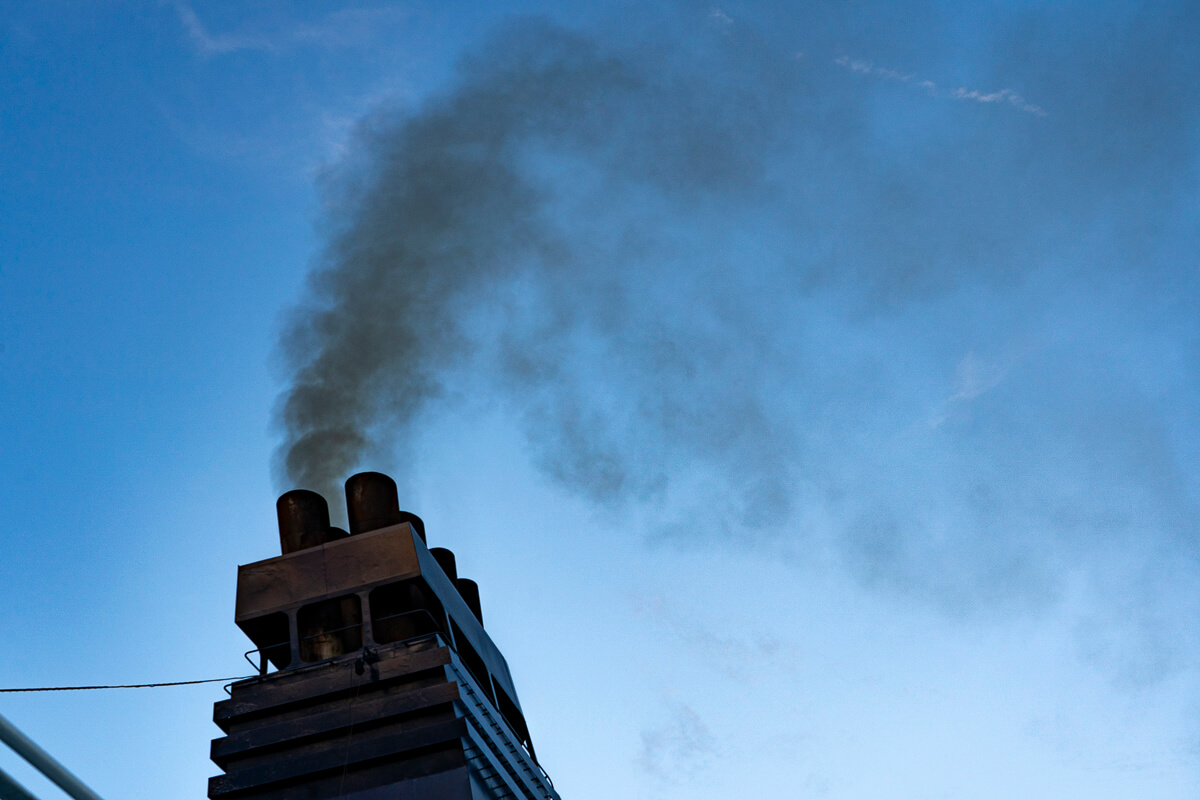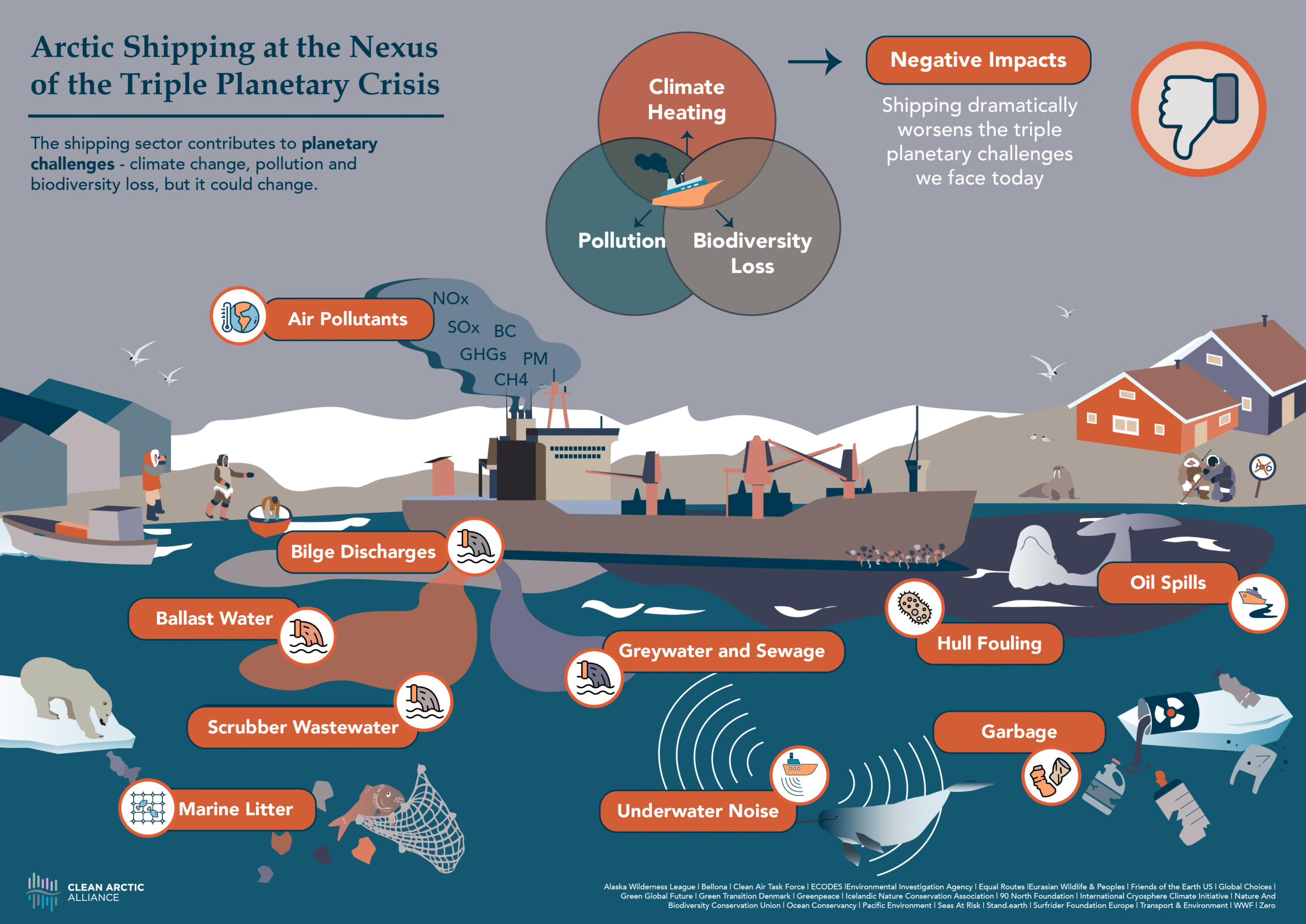In case you missed our PPR 9 Briefing Video: How to Reduce Arctic Shipping’s Black Carbon Emissions and Scrubber Discharges
London, April 4th, 2022:- As a meeting of the International Maritime Organization’s Pollution Prevention and Response sub-committee (IMO, PPR 9, April 4-8) opens today, NGOs called for the IMO to slash the impact of black carbon emissions on the Arctic by developing a mandatory regulation requiring a switch to distillate or alternative cleaner fuels or methods of propulsion for vessels operating in or near Arctic water [1,2].
“At PPR 9, IMO member states must agree on ambitious and urgent global action to dramatically reduce ship-source black carbon emissions this decade, in order to mitigate the climate crisis in the Arctic”, said Dr Sian Prior, Lead Advisor to the Clean Arctic Alliance, a coalition of 20 non-profit organisations working to persuade governments to take action to protect the Arctic, its wildlife and its people. “However, individual states and regions must also play their part by taking immediate action of their own to cut black carbon emissions from shipping”.
In November 2021, during a meeting of its Marine Environment Protection Committee (MEPC 77) , the IMO adopted a resolution which could lead to a significant cut in the climate impact caused by ship black carbon emissions on the Arctic [3]. Having grappled with the issue for over a decade, the IMO’s adoption of this resolution is an important development in moving away from the dirtiest shipping fuels.
The NGO community have submitted a paper to PPR 9 in this regard: PPR 9-8-2 – Prioritizing control measures to reduce Black Carbon emissions impacting the Arctic.
“The IMO’s black carbon resolution strongly encourages governments to start addressing the threat to the Arctic from black carbon emissions, and provides a pathway for regional or national action. It also urges ship operators to reduce black carbon emissions by switching to distillate, or other cleaner alternative fuels or methods of propulsion when operating in or near the Arctic”, said Prior. “The threat to the Arctic from black carbon from shipping has been known for some time – and what happens in the Arctic doesn’t stay in the Arctic – and the recent high temperatures in the Arctic and Antarctic may be signs of how climate change is impacting the polar regions”.
In March 2022, temperatures in the Arctic were recorded at 30 degrees Celsius above normal levels for the time of year [4]. Changes to a heating Arctic climate will undoubtedly have serious repercussions further south. When black carbon, a short-lived climate-forcer responsible for around 20% of shipping’s climate impact, is emitted from the exhausts of ships and settles onto snow and ice, it accelerates melting and the loss of reflectivity – the albedo effect – which creates a feedback loop that further exacerbates local and global heating.
Due to the use of heavy fuel oils and increased Arctic shipping traffic, emissions of black carbon from ships in the Arctic increased 85% between 2015 and 2019. With the Arctic heating-up faster than anywhere on Earth, it’s clear that this upward trend of black carbon emissions must be reversed urgently.
“Fortunately, the short-lived nature of black carbon means that reductions in emissions can deliver immediate climate benefits, and with simple regulatory options including a switch to cleaner fuels on the table, action to reduce ship-source black carbon should be politically attractive”, added Prior. “During this week’s meeting of the IMO’s Sub-Committee on Pollution Prevention and Response (PPR 9), governments and the shipping industry must commit to making this switch to cleaner fuels in the Arctic, and ultimately move towards the decarbonisation of the shipping industry”.
A ban on heavy fuel oils to reduce the risks of a HFO spill in the Arctic was agreed by the IMO in 2021, but it will be the best part of a decade before it takes full effect and the area to which it applies will be insufficient to reduce black carbon emissions to the extent needed.
“In the meantime, if all shipping currently using heavy fuel oils while in the Arctic were to switch to distillate fuel, there would be an immediate reduction of around 44% in black carbon emissions from these vessels, and the benefits of reduced black carbon would be felt immediately”, said Kåre Press-Kristiansen, Senior advisor, Air Quality & Climate, Green Transition Denmark (Grøn Omstilling). “If all ships operating in the Arctic subsequently installed particulate filters, something that isn’t possible when burning HFO, black carbon emissions could be reduced by an additional 90% or more”.
“In addition, to a new mandatory regulation requiring a switch to distillate for ships operating in or near the Arctic and installing diesel particulate filters, IMO Members should also commit to to the urgent development of a global fuel standard which would reduce black carbon emissions by controlling the aromatic content of acceptable fuels”, he added.
Relevant paper: PPR 9-8-3 – Fuels are key to urgent Black Carbon emission reductions.
“We’re also calling on IMO members to adopt measures that will prohibit the use of scrubbers in all waters globally; and until such a ban can be implemented, use risk and impact assessment guidelines to support the introduction of regional bans in vulnerable areas as an interim measure, beginning with Arctic waters”, said Eelco Leemans, Technical Advisor to the Clean Arctic Alliance.
Scrubbers are devices used to take out sulfur oxide (SOx) from ship’s exhaust emissions. This SOx, together with a range of pollutants (PAH, metals), is then discharged into the sea, leading to pollution of the marine environment.
More information about scrubbers here.
IMO paper on Scrubbers: PPR 9-10-4 – Urgent matters related to the harmful effects of EGCS wastewater discharges and conflicts with international treaty .commitments and duties.
“IMO progress on binding global measures to curb black carbon emissions from ships has, up to now, been pitifully slow. But MEPC 77’s green light for national and regional regulatory action on ship black carbon emissions sends an important signal – it is now up to individual states at a national level and working regionally when appropriate, to take full advantage of the tools that are available to them to ensure that ships sailing in or near the Arctic reduce their black carbon emissions.
The IMO resolution clearly indicates that regional or national action to reduce black carbon emissions is needed, so it is imperative that the EU includes a ship black carbon measure in its flagship “Fit for 55” climate package.
Infographic: Tackling ships’ black carbon emissions in the Arctic through EU action
ENDS
Contacts:
Dave Walsh, Clean Arctic Alliance Communications Advisor [email protected] +34 691 826 764
Notes:
[1] Sub-Committee on Pollution Prevention and Response, PPR 9 , 4-8 April 2022 https://www.imo.org/en/MediaCentre/MeetingSummaries/Pages/PPR-default.aspx
[2] Black Carbon: https://cleanarctic.org/campaigns/the-arctic-climate-crisis/black-carbon-in-the-arctic/
[3] NGOs Welcome IMO Agreement to Cut Black Carbon Impacts on Arctic, 26 November 2021
https://cleanarctic.org/2021/11/26/ngos-welcome-imo-agreement-to-cut-black-carbon-impacts-on-arctic/
IMO resolution paper on black carbon MEPC 77/9
[4] Heatwaves at both of Earth’s poles alarm climate scientists, Associated Press, March 19, 2022.
https://phys.org/news/2022-03-hot-poles-antarctica-arctic-degrees.html
About the Clean Arctic Alliance
Made up of 20 not-for-profit organisations, the Clean Arctic Alliance campaigns to persuade governments to take action to protect the Arctic, its wildlife and its people.
Members include: The Altai Project, Alaska Wilderness League, Bellona, Clean Air Task Force, Green Transition Denmark, Ecology and Development Foundation ECODES, Environmental Investigation Agency, Friends of the Earth US, Global Choices, Greenpeace, Iceland Nature Conservation Association, International Cryosphere Climate Initiative, Nature And Biodiversity Conservation Union, Ocean Conservancy, Pacific Environment, Seas At Risk, Surfrider Foundation Europe, Stand.Earth, Transport & Environment and WWF.
More more information visit https://www.cleanarctic.org/
Twitter: https://twitter.com/CleanArctic



